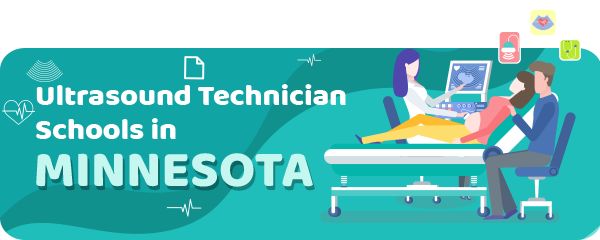
Minnesota is a rapidly growing state when it comes to medical careers, including ultrasound technicians.
If you are thinking of starting a career in the field, you should first know there are some requirements.
Read on in order to know what are the steps to take to become an ultrasound technician.
Training Requirements for Minnesota Ultrasound Techs
In this state, you need to take some classes before becoming eligible to enroll in a program.
The programs are offered through community colleges and trade schools.
After getting into the program, you need to take classes on pathophysiology, vascular ultrasound, and ultrasound physics.
In order to get more experience in the field, 6 months of practical experience are also required before getting a certification.
The programs vary in duration, which depends on how long you are willing to study,
For example, an ultrasound program that provides a certification usually lasts for one year.
But, you may want to get additional training to get a better-paid job and more opportunities.
In this case, consider pursuing a bachelor’s or associate’s degree, which lasts from 2 to 4 years.
You can also choose to get a specialization, which will provide you further credentials.
After you finish the training program, you will have to pass a test managed by The American Registry for Diagnostic Medical Sonography.
| School Name | Address |
|---|---|
| Argosy University-Twin Cities | 1515 Central Parkway, Eagan, Minnesota 55121 |
| Lake Superior College | 2101 Trinity Rd, Duluth, Minnesota 55811 |
| Mayo School of Health Sciences | 200 First St SW, Rochester, Minnesota 55905 |
| MRI School of Minnesota | 4600 Oak Grove Pkwy, Minneapolis, MN 55443 |
| St Catherine University | 2004 Randolph Ave, Saint Paul, Minnesota 55105 |
| St Cloud Technical and Community College | 1540 Northway Drive, Saint Cloud, Minnesota 56303 |
This exam covers subjects like:
- neurosonography,
- abdomen,
- fetal echocardiography,
- breast sonography,
- obstetrics and gynecology.
The test will also cover general sonography principles.
You can choose to study in an accredited school or a non-accredited one.
However, if you choose the latter, you need to provide proof of finishing 60 semester hours of training, one year of job experience, and a mandatory internship.
You can also get a license for breast sonography or vascular sonography from The American Registry of Radiologic Technologists or Cardiovascular Credentialing International.
These licenses also require passing an exam.
The topics covered in the testing are:
- general sonography,
- ultrasound physical principles,
- patient care.
The certification needs to be renewed every 24 months.
Before you can renew it, you need to take 24 extra education credits that will cover updates.
How Can You Get Hired in Minnesota?
As per reports released by BLS in 2018, there will be a 17% growth in ultrasound technicians from 2016 to 2026.
Minnesota does not require ultrasound technicians to have a license, however, getting one provides better job opportunities.
How much you will make in this state depends on your specialization, work experience and the area you live in.
As an ultrasound technician, you can expect to earn an average salary of $78,123 per year.
Annual Salary Range:| Location | Avg. Annual Salary |
|---|---|
| Minneapolis | $81,216 |
| St. Paul | $81,216 |
| Rochester | $73,961 |
| Duluth | $72,434 |
| St. Cloud | $72,036 |
| Lakeville | $80,712 |
| Eden Prairie | $81,079 |
| Burnsville | $80,987 |
| Minnetonka | $81,216 |
| Moorhead | $71,647 |
Regional Salary in Minnesota
| Region | Employed | Avg. Annual Salary | Avg. Hourly Pay | Top 10% Annual Salary | Bottom 10% Annual Salary |
|---|---|---|---|---|---|
| Duluth, MN-WI | 70 | $83,890 | $40.33 | $104,120 | $65,620 |
| Minneapolis-St. Paul-Bloomington, MN-WI | 960 | $91,240 | $43.87 | $107,800 | $80,330 |
| Rochester, MN | 260 | $89,350 | $42.96 | $107,960 | $80,350 |
| St. Cloud, MN | 50 | - NA - | - NA - | - NA - | - NA - |
* Employment conditions in your area may vary.
Ultrasound technicians can easily find work in medical facilities such as hospitals, clinics, and doctor’s offices.
Read the full guide: How to Become an Ultrasound Technician